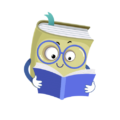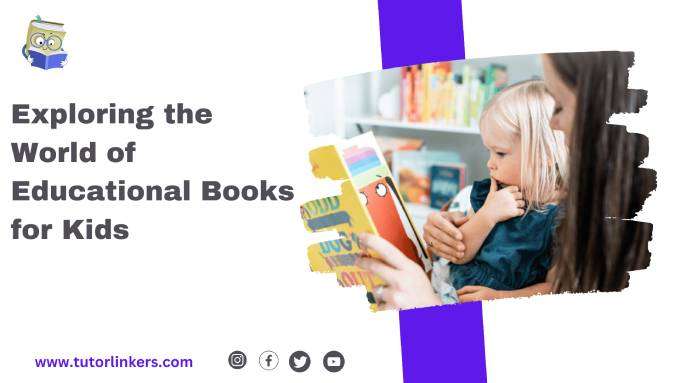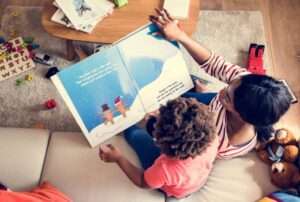the World of Educational Books for Kids: In the journey of childhood development and learning, few tools are as impactful and essential as educational books. Books not only ignite imagination and creativity but also serve as invaluable sources of knowledge and inspiration for young minds. In this blog post, we will delve into the diverse realm of educational books for kids, exploring their types, benefits, and ways to integrate them into children’s reading routines.
Reading plays a fundamental role in a child’s cognitive, emotional, and social development. Educational books specifically designed for kids offer a wealth of benefits beyond traditional storytelling, providing valuable information, fostering critical thinking, and expanding vocabulary.
Online tutor platforms complement the benefits of educational books by providing personalized academic support and guidance tailored to each child’s learning needs. By incorporating educational books into a child’s reading routine and supplementing with online tutoring, parents can optimize their child’s educational experience and foster a holistic approach to learning and development.
2. Types of Educational Books
Educational books for kids come in various forms, catering to different interests and age groups:
Fictional Educational Books
Fictional educational books combine storytelling with educational themes to engage young readers. They often convey moral lessons, encourage problem-solving, and introduce new concepts through imaginative narratives. Examples include picture books with life lessons and chapter books that explore historical events through fictional characters.
Non-Fiction Educational Books
Non-fiction educational books encompass encyclopedias, reference materials, and topic-specific books that delve into subjects like science, history, geography, nature, and more. These books are rich in factual content, presenting information in an accessible and engaging format for young learners.
3. Benefits of Educational Books for Kids
The advantages of reading educational books extend far beyond academic enrichment:
Cognitive Development
Reading educational books enhances vocabulary, language skills, and comprehension abilities. It stimulates critical thinking and encourages children to explore new ideas and perspectives.
Educational Content
Educational books introduce children to a wide range of subjects, from science and mathematics to art and culture. They help build foundational knowledge and spark curiosity about the world around them.
4. Choosing the Right Educational Books
When selecting educational books for kids, consider:
Age-Appropriate Books
Choose books that align with the child’s age and reading level to ensure comprehension and engagement. Younger children may enjoy colorful picture books with simple text, while older children can explore chapter books with more complex narratives.
Interest-Based Books
Opt for books that resonate with the child’s interests, hobbies, or passions. Whether it’s dinosaurs, space exploration, or historical figures, matching the book’s content to the child’s preferences enhances motivation and enjoyment.
Interactive and Engaging Books
Look for educational books that go beyond text, incorporating interactive elements like puzzles, quizzes, experiments, or hands-on activities. Interactive books foster active learning and make education fun and memorable.
| Aspect | Description |
|---|---|
| Age-Appropriate | Select books that align with the child’s age and reading level to ensure comprehension and engagement. |
| Interest-Based | Choose books that resonate with the child’s hobbies, passions, or curiosities to enhance motivation and enjoyment. |
| Interactive Features | Look for books with interactive elements such as puzzles, quizzes, experiments, or hands-on activities to promote active learning. |
| Educational Content | Opt for books that introduce new facts, ideas, and concepts, building a strong foundation in various subjects. |
5. Popular Educational Book Series
Explore renowned educational book series that captivate young readers:
| Educational Book Series | Key Features |
|---|---|
| Magic School Bus | Engaging science adventures led by Ms. Frizzle |
| Who Was? | Biographies of notable historical figures |
| National Geographic Kids | Exploration of nature, wildlife, and world cultures |
| I Survived | Historical fiction series based on real-life events |
| Berenstain Bears | Moral lessons and family-centered storytelling |
6. Educational Books Across Different Subjects
Educational books cover a wide range of subjects, providing children with opportunities to explore various fields of knowledge:
- Science and Nature: Books on animals, plants, outer space, and scientific phenomena.
- History and Biography: Biographies of historical figures, books on ancient civilizations, and key events in history.
- Arts and Crafts: Books featuring art techniques, DIY projects, and creative activities.
- Mathematics and Logic: Books that make math concepts accessible and engaging through games, puzzles, and real-life applications.
7. Encouraging Reading Habits in Children
Promote a love for reading through:
- Creating a cozy reading corner at home with comfortable seating and good lighting.
- Establishing a regular reading routine, such as bedtime stories or family reading sessions.
- Visiting libraries and bookstores regularly to discover new books and encourage exploration.
8. Digital vs. Physical Educational Books
Consider the pros and cons of digital e-books versus traditional printed books:
- Digital Books: Interactive features, accessibility across devices, and instant access to a vast library. However, prolonged screen time may be a concern.
- Printed Books: Tangibility, reduced screen time, and the tactile experience of turning pages. They are also ideal for shared reading experiences.
9. Resources for Finding Educational Books
Discover educational books through:
- Online bookstores with dedicated children’s sections and curated lists of educational titles.
- Recommendations from educators, librarians, and reputable parenting websites that offer book reviews and reading guides.
- Local libraries and community events focused on literacy and children’s literature.
10. Conclusion
Incorporating educational books into a child’s reading repertoire enriches their educational journey and nurtures a lifelong love for learning. By choosing age-appropriate, engaging books across various subjects, parents and caregivers can empower children to explore, discover, and expand their horizons through the wonderful world of literature.
Educational books are not only educational tools but also portals to new worlds and endless possibilities. Let’s continue to cultivate a generation of lifelong learners through the magic of educational reading!
Read More; Adjustable study desks for children
FAQ’s
- FAQ: How can I create a cozy reading corner at home for my child?
- Answer: You can create a cozy reading corner by designating a quiet area with comfortable seating, soft pillows or bean bags, good lighting, and shelves filled with books. Add personal touches like blankets or wall decorations to make it inviting and appealing to your child.
- FAQ: What are some effective ways to establish a regular reading routine with my child?
- Answer: To establish a regular reading routine, set aside dedicated reading time each day or evening. Make it a consistent part of your daily schedule and engage in shared reading sessions with your child. Encourage them to choose books that interest them to keep them motivated.
- FAQ: How can I encourage my child to visit libraries and bookstores regularly?
- Answer: Make visiting libraries and bookstores an exciting outing by planning special trips or activities around them. Attend library storytime sessions, participate in book-related events, or let your child pick out books to borrow or purchase. Highlight the fun and discovery of exploring new books and stories in these environments.
Ehsan Ali is a seasoned content writer and researcher with a talent for translating complex concepts into clear, engaging content. With a deep understanding of human behavior, societal trends, and technical topics, Ehsan creates insightful and impactful content that resonates with a broad audience. His expertise ensures that each piece is both accessible and compelling, bridging the gap between intricate details and everyday understanding.





